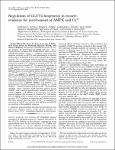Regulation of GLUT4 biogenesis in muscle: evidence for involvement of AMPK and Ca2+

View/
Date
2002Author
Ojuka, Edward O.
Jones, Terry E.
Nolte, Lorraine A.
Chen, May
Wamhoff, Brain R.
Sturek, Micheal
Holloszy, John O.
Metadata
Show full item recordAbstract
Regulation of GLUT4 biogenesis in muscle:
evidence for involvement of AMPK and Ca2 . Am J
Physiol Endocrinol Metab 282: E1008–E1013, 2002; 10.1152/
ajpendo.00512.2001.—There is evidence suggesting that
adaptive increases in GLUT4 and mitochondria in skeletal
muscle occur in parallel. It has been reported that raising
cytosolic Ca2 in myocytes induces increases in mitochondrial
enzymes. In this study, we tested the hypothesis that an
increase in cytosolic Ca2 induces an increase in GLUT4. We
found that raising cytosolic Ca2 by exposing L6 myotubes to
5 mM caffeine for 3 h/day for 5 days induced increases in
GLUT4 protein and in myocyte enhancer factor (MEF)2A and
MEF2D, which are transcription factors involved in regulating
GLUT4 expression. The caffeine-induced increases in
GLUT4 and MEF2A and MEF2D were partially blocked by
dantrolene, an inhibitor of sarcoplasmic reticulum Ca2 release,
and completely blocked by KN93, an inhibitor of Ca2 -
calmodulin-dependent protein kinase (CAMK). Caffeine also
induced increases in MEF2A, MEF2D, and GLUT4 in rat
epitrochlearis muscles incubated with caffeine in culture
medium. 5-Aminoimidazole-4-carboxamide ribonucleoside
(AICAR), which activates AMP-activated protein kinase
(AMPK), also induced approximately twofold increases in
GLUT4, MEF2A, and MEF2D in L6 myocytes. Our results
provide evidence that increases in cytosolic Ca2 and activation
of AMPK, both of which occur in exercising muscle,
increase GLUT4 protein in myocytes and skeletal muscle.
The data suggest that this effect of Ca2 is mediated by
activation of CAMK and indicate that MEF2A and MEF2D
are involved in this adaptive response.
5 -adenosine monophosphate-activated protein kinase; gene
expression; skeletal muscle; tissue culture; myocyte enhancer
factor 2; Ca2 -calmodulin-dependent protein kinase
